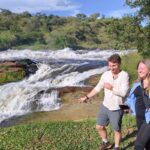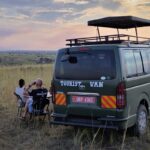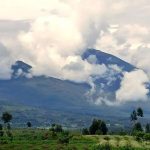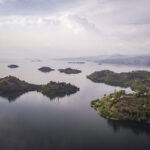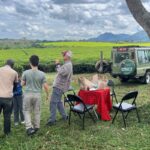This Tanzania packing list is meant to help you to best plan and pack for your adventure. Tanzania is a beautiful country known for its stunning landscapes, incredible wildlife, and rich cultural heritage.
Whether you are planning to climb Mount Kilimanjaro, go on a safari, or relax on the beaches of Zanzibar, it’s important to pack appropriately to ensure you have a comfortable and enjoyable experience.
Here’s a list of things you should consider packing for your trip to Tanzania.
Safari packing list for Tanzania
1. Clothing
Tanzania has a warm and humid climate so when it comes to clothing for a trip to Tanzania, it’s important to consider the climate and cultural norms. Lightweight and breathable clothing made from natural fabrics such as cotton and linen are recommended to keep cool in the hot and humid climate.
However, modest clothing is expected in many areas, especially when visiting religious sites or rural villages.
This means avoiding revealing clothing such as shorts, mini-skirts, and tank tops. Additionally, it’s important to bring comfortable and sturdy footwear for any outdoor activities, such as hiking or safari tours.
Don’t forget to also pack a rain jacket or poncho for the rainy season, which typically runs from March to May and October to December.
If you plan to go on a safari, it’s recommended to wear neutral-colored clothing to blend in with the environment and avoid attracting insects. Be sure to also pack a light jacket or sweater for cooler evenings and early morning game drives.
2. Footwear
When it comes to footwear for Tanzania, comfort and practicality should be your top priorities. Many activities such as hiking, walking on rough terrain, and visiting national parks are likely to be part of your itinerary, so it’s important to have sturdy and comfortable shoes or sandals.
It’s also a good idea to bring a pair of shoes that can easily be slipped on and off, as many homes and businesses in Tanzania require shoes to be removed before entering. Remember to pack socks and foot powder to keep your feet dry and prevent blisters.
Additionally, if you plan on doing any water activities such as snorkeling or diving, be sure to pack appropriate water shoes. Lastly, it’s always a good idea to bring a pair of flip-flops or sandals for lounging around the pool or beach.
3. Sun protection
The sun can be strong and harsh in Tanzania, and you want to make sure you are prepared to protect your skin. Sunscreen with a high SPF is a must-have, as well as a hat to protect your face and neck. Sunglasses are also crucial to protect your eyes from the glare of the sun.
Additionally, lightweight, long-sleeved clothing made from breathable fabric can help protect your skin from the sun while keeping you cool in the heat. Don’t forget to bring a refillable water bottle to stay hydrated throughout the day!
4. Insect repellent
 Mosquitoes and other biting insects are prevalent in many areas of the country, and they can carry diseases such as malaria and dengue fever. Be sure to choose a repellent that contains DEET or other effective ingredients, and apply it liberally before heading out into nature.
Mosquitoes and other biting insects are prevalent in many areas of the country, and they can carry diseases such as malaria and dengue fever. Be sure to choose a repellent that contains DEET or other effective ingredients, and apply it liberally before heading out into nature.
You may also want to bring lightweight long-sleeved shirts and pants to further protect yourself from insect bites. It’s better to be safe than sorry, so don’t forget to pack insect repellent.
5. Medical supplies
It’s always a good idea to pack a small first-aid kit with essentials like band-aids, antiseptic cream, pain relievers, and any prescription medications you may need.
You may also want to consider bringing anti-diarrheal medication and oral rehydration salts in case of stomach upset. Additionally, it is recommended to bring water purification tablets or a water filter to ensure safe drinking water.
It is important to consult with your healthcare provider before your trip to ensure you are up-to-date on any necessary vaccinations and to discuss any specific medical concerns.
6. Chargers
Don’t forget to bring chargers for all your electronic devices, including phones, cameras, and laptops. It’s important to ensure that your devices are charged and ready to use, especially if you’re planning on taking photos or using navigation apps while out and about.
Additionally, it’s a good idea to bring a power bank or portable charger, as access to electricity may be limited in some areas.
Be sure to pack the appropriate adapters or converters, as Tanzania uses a Type D or Type G electrical outlet. It’s also a good idea to bring a universal adapter if your chargers have a different plug type than what is used in Tanzania.
7. Camera and binoculars
Tanzania is home to some of the most breathtaking wildlife and scenery in the world, and you’ll want to capture these memories. A camera with a good zoom lens is a must-have, as it will allow you to take close-up shots of wildlife, landscapes, and people.
Binoculars are also essential for observing wildlife from a distance, especially when on safari.
Make sure to bring extra batteries, memory cards, and a protective case for your camera and binoculars to ensure they are safe and functional throughout your trip.
8. Cash and Credit Cards
 While credit cards are accepted in larger cities and tourist areas, it’s important to have cash on hand for smaller purchases and in rural areas where credit card machines may not be available. Additionally, it’s recommended to exchange some money into Tanzanian shillings for use in local markets and small businesses.
While credit cards are accepted in larger cities and tourist areas, it’s important to have cash on hand for smaller purchases and in rural areas where credit card machines may not be available. Additionally, it’s recommended to exchange some money into Tanzanian shillings for use in local markets and small businesses.
The cash is also good for tipping service people in the various places where you will be visiting.
9. Water bottle
A reusable water bottle is a must-have when packing for Tanzania. It’s essential to stay hydrated in the hot and humid climate, and having a refillable water bottle will save you money and help reduce plastic waste.
You can fill up your bottle at your hotel or lodge before heading out for the day, or purchase purified water from local shops or vendors. Just make sure to always have your bottle with you to avoid dehydration, especially if you’re planning on outdoor activities or long hikes.
10. Travel Documents
In addition to the items listed above, it’s crucial to remember to pack all necessary travel documents. This includes a valid passport, visas (if required), travel insurance, and any necessary medical documents or prescriptions.
It’s also a good idea to make copies of these documents and keep them in a separate, safe location in case the originals are lost or stolen.
Additionally, if you plan on driving in Tanzania, make sure to bring your driver’s license and an international driving permit. By ensuring that you have all necessary travel documents, you can enjoy a stress-free and memorable trip to Tanzania.
Conclusion
Packing for a safari in Tanzania requires careful consideration of various factors such as the weather, activities planned, and personal needs.
Depending on the specific details of your safari and when you will be visiting Tanzania, some of the items on the packing list might be more important than others. When you are booking with us, we always consider this and give packing recommendations that match with your safari.
With proper planning and packing, you will enjoy a comfortable and memorable trip to Tanzania.


